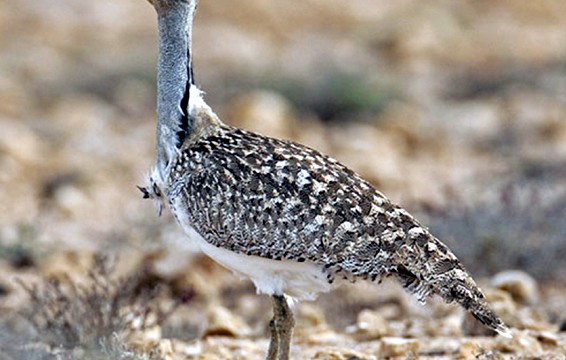Houbara Bustard: Case Leads to Formation of a Commission on Sustainability of Hunting Permits
There has been a common misconception on the judgment of the Honourable Supreme Court of Pakistan reported as PLD 2016 SC 421. This judgment has not allowed the provincial governments to issue hunting permits with respect to the Houbara Bustard bird. The real position taken by the Supreme Court in its review judgment is that it has allowed the provincial government to legislate on the subject of wildlife, and therefore it can remove the Houbara Bustard from the Third Schedule (list of protected species) of Punjab Wildlife (Protection, Management, Conservation) Act 1974. The court never allowed the provincial government to issue hunting permits unequivocally. It has also been added that while giving hunting permits, the development of the area must be kept in consideration along with the benefits it provides to the residents of that area.
The prime question before the Lahore High Court was whether it was sustainable to allow hunting permits to foreign dignitaries, and how the procedure of hunting permits should take place. Appearing on behalf of the petitioners, I along with Mr. Kalim Illyas argued that it was not the domain of the Foreign Ministry to allocate areas for Houbara Bustard hunting as it came under the authority of Provincial Wildlife Department to issue permits and allocate areas. Moreover, the parawise comments of the provincial government presented before the Lahore High Court stated that although the provincial government had issued the hunting permits, the allocation was done by the Foreign Ministry on the recommendations of the Prime Minister. This raised objections as approval of the Ministry of Climate Change was not sought under the domain of which lied the subject of conservation of natural habitats and species.
I along with Mr. Kalim Illyas, argued that although provincial governments had power to remove the Houbara Bustard from the Third Schedule (protected species) through legislation and after cabinet’s approval, it must be observed how the decision-making of the provincial government had taken place, considering that Houbara Bustard has been listed amongst endangered species under the Convention on International Trade of Endangered Species (CITES) as well as in the list of the International Union of Conservation of Natural Habitats. According to the Convention on Migratory Species, Houbara Bustard is classified under the unfavourable conservation status. Therefore, the overall status of Houbara Bustard has been threatened with “extinction” and the question arises as to how hunting permits can be given by the provincial government relying on these facts. Furthermore, the provincial government only placed reliance on a survey of the Houbara Foundation funded by Abu Dhabi which stated that the hunting of Houbara Bustard would not result in extinction and was therefore sustainable.
On the other hand, it was brought to the attention of the court that the survey of World Wildlife categorically stated that the way hunting permits were being currently issued by the government made it foreseeable that within twenty to twenty-five years the species of Houbara Bustard would be completely extinct. Essentially, the report of World Wildlife stated that hunting permits issued by the provincial government on the recommendation of the Foreign Ministry were not sustainable. During the proceedings, I also referred to the book Confessions of an Economic Hitman written by John Perkins in which he states how resources of a developing country are plundered by foreign dignitaries or multinational corporations in exchange for personal benefits or vested interests mostly secured by the political elite of the developing country.
After hearing arguments from both sides, the Honourable Chief Justice decided to set up a commission to examine the study conducted by World Wildlife and the survey of the Houbara Foundation. To confirm ‘epistemic certitudes’ the commission chaired by eminent expert Dr. Pervez Hassan, will seek the assistance of World Wildlife, non-governmental organizations, Zoology Department, Punjab Wildlife Department, Houbara Foundation and the local residents of Bhakkar and Rahim Yar Khan where hunting permits were issued. Although this will entail strenuous efforts, it will help the Honourable Chief Justice reach a conclusion regarding the sustainability of the hunting permits issued.
The Houbara Bustard case has also led to the development of jurisprudence, as now under Article 199 of the Constitution a commission can be formed in order to resolve disputed questions of facts in relation to issues of public importance. Hats off to the Honourable Chief Justice for taking necessary steps and widening the interpretation of Article 199.
The writer appeared as counsel in this case.
The views expressed in this article are those of the author and do not necessarily represent the views of CourtingTheLaw.com or any other organization with which he might be associated.


